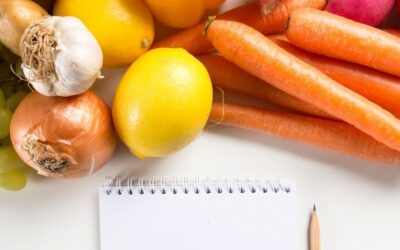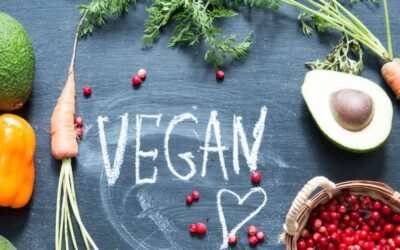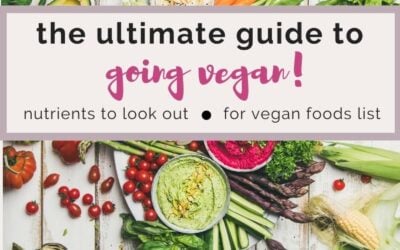Thinking about going vegan? Wondering what vegans can and can not eat? This complete guide to veganism for beginners will cover what veganism is, what vegans can and can not eat, how to know if veganism is right for you as well as what nutrients to look out for in order to prevent deficiencies! I’ll also give you a full vegan foods list for beginners to get you started right!

What Is Veganism?
Veganism is similar to vegetarianism, but one step further. This diet excludes all animal based products including meat, dairy, eggs, and even products that are made using animal products such as white sugar, some beer and wines, and sometimes honey (we will discuss this more soon!)
Along with a vegan diet many choose to incorporate the exclusion of animal products into their lifestyle as well. This includes avoiding products made with leather, wool, silk, and fur. In addition to being wary of cosmetics and beauty products that may contain animal products or having been tested on animals.

What Can You Eat On A Vegan Diet?
Let’s make veganism for beginners easy and look at what you CAN eat. Many foods fit under the vegan umbrella including fruits, vegetables, beans/legumes, grains, tofu, and plant based milks and dairy products.
Here are a few specific examples:
- All fruits and vegetables
- Beans: black beans, garbanzo beans, kidney beans (to name a few)
- Tofu, tempeh, and other soy based meat alternatives, vegan protein powder, and nuts
- Wheat, quinoa, rice, pasta, farro, oats, ect
- Milk and yogurt made from almond, coconut, oat, and soy base
One food that is debated is honey on whether or not it’s vegan. But the majority seem to side with no honey is not vegan because it’s utilizing animals aka bees and ultimately consuming their byproduct. Some vegan friendly alternatives for this sticky sweetener include maple syrup, date syrup, and molasses.
Long term and beginner vegans do need to be aware of not only the core foods but also the processing and additives that may be present. For instance white sugar is can be made using bone char to help filter it. Other alternatives include coconut or beet sugar, as well as vegan sugar alternatives which can include maple syrup, agave, and molasses.
Some tricky ingredient names that a beginner vegan should watch out for that indicate animal products include things like whey, casein, lactose, and gelatin to name just a few. Reading food labels or checking out items online can help clear up any confusion on whether or not an item is vegan.

Things To Consider Before Going Vegan
If you’re considering going vegan ask yourself WHY. Why do you want to become vegan? Is it for animal rights, sustainability, etc. Be very honest with yourself. Many times, due to diet culture, the choice to become vegan is centered around health and/or weight loss, however this isn’t always the best decision to make.
Veganism shouldn’t be used as a way to restrict food intake. Firstly, that will likely “backfire”, causing you to overeat restricted foods (like a big ol’ juicy cheeseburger or pint of ice cream) later on. And secondly, studies have shown the connection of disordered eating and vegan/vegetarian diets.
Now, that’s not to say that anyone who goes vegan is going to develop disordered eating- not at all! However, it’s important to understand WHY you are going vegan and it shouldn’t be used as a way to sneakily eat disorderly by depriving yourself. Unfortunately, doing just that is all to common.
If you feel passionate about making this dietary change because of animal activism or actual non weight focused health benefits…. Then go for it. But if you’re finding yourself feeling fearful of foods, wanting to restrict your diet because other animal based feel like a no no in terms of food guilt & diet culture, or your end goal is simply to restrict in order to lose weight take the time to focus on you and break those food rules. You can checkout my blog post on how to identify and break food rules for more guidance on that!
Personally, I practice & teach intuitive eating and I DO believe you can be vegan and follow intuitive eating. This is a question I get a lot! My blog post on intuitive eating with dietary restrictions can help explain this more!
Nutritional Benefits Of A Vegan Diet
Studies show that there are definitely some benefits of a vegan diet, specifically benefiting your cardiovascular health. With a vegan diet there is normally higher intake of fruits, veggies, and whole grains which are packed with fiber, folic acid, antioxidants, and phytochemicals. This can be a major plus as these nutrients are associated with lower cholesterol, risk of stroke, and a lower risk of mortality from stroke and cardiovascular heart disease.
It’s also been shown that a vegan diet could aid in lowering the risk of developing type 2 diabetes. Most foods under the vegan umbrella are low in glycemic index and glycemic load which can be helpful in managing blood sugar levels. Another study showed the reduction and elimination of red meat aiding in prevention of type 2 diabetes.
Phytochemicals, which are found in plant based foods, include compounds such as carotenoids, flavonoids, and lycopene that are continually being researched for their health benefits. These compounds can impact our cells and have even been shown to protect against specific types of cancer.
Other benefits that are still being researched include a vegan diets impact on arthritis in which one study which had participants follow a whole food plant based diet (i.e not completely specified as a strict vegan diet) showed improvements in regions of osteoarthritis in participants.

A vegan diet can be great for your gut microbiome as it expands the diversity of the good bacteria. Whole foods such as fruits, vegetables, and whole grains which tend to be high in a vegan diet are packed with fiber that influence the gut microbiota. Additionally, vegan diets tend to be higher in mono and polyunsaturated fats which are beneficial to gut health, and low in saturated fats that mostly come in animal products which normally have negative impact on your gut.
Now, to get these benefits you don’t need to go totally vegan if that’s not aligned with your views/preferences. You can also simply focus on including more plant based foods without the restriction side. This is much more sustainable and healthy (mentally and physically) while staying true to yourself.
Potential Negative Side Effects
Due to the restrictions of what vegans can and can not eat there is the risk of inadequately nourishing one’s body with the necessary nutrients. This can lead to things like anemia, low bone density, and low intake of a variety of essential nutrients.
Because of these risks for deficiency it does require the beginner vegan to do more planning for their meals than they may be used to in order to ensure they get all of the nutrients they need.
Nutrients Of Concern For Beginner Vegans
Protein
Protein is made up of things called amino acids. And while you can find vegan sources of protein their amino acid composition is different than animal based protein sources. One amino acid of concern is lysine. Beans, which are a common protein source for vegans, tends to be low in lysine.
So, if beans were the only source of protein in a vegan diet and they met the grams of protein needed per day they may still be consuming inadequate amounts because the TYPE of protein is inadequate. Higher lysine containing vegan protein sources include tofu, tempeh, soy milk, soy derived meat alternatives and peanuts/peanut butter.
Additionally, it’s recommended that vegans consume a higher amount of total protein per day as opposed to non-vegans due to the lower digestibility of plant proteins.
Vitamin B12
This is another nutrient that beginner vegans should always keep in mind as a vegan as B12 only really comes from animal products. It was reported that, “52% of vegans had a blood level of vitamin B12 that was at the point of deficiency”. B12 deficiency can be concerning and have impacts on your neurologic and psychiatric system including things like dementia, mood disturbances, disorientation and difficulty concentrating.
Talk to your doctor or RD about starting a supplement that will work best for you and make sure to incorporate some fortified foods such as grains like cereal and bread, soy products, and meat alternatives that contain b vitamins.

Iron
If you’re vegan you’ll only be getting non-heme iron, which is the type that comes from plant based sources. Non-heme iron isn’t as easily used within your body so you’ll need to consume more of it to compensate for that. Some plant based sources of iron include: leafy greens, legumes, quinoa, and tofu.
There are also a few things to consider to amplify your ability to absorb the iron you do eat. Soaking, sprouting, fermenting, and cooking beans, grains, and seeds can diminish phytate levels (which inhibit your iron absorption) which then ultimately improve the absorption overall.
Additionally, another idea to meet your iron needs could be to boost your vitamin C intake which enhances iron absorption. A couple sources of vitamin C are oranges/juice, broccoli, and peppers. You can also try cooking in a cast iron pan which could aid in your iron intake minus the animal product.
Zinc
Vegan diets tend to be lower in zinc. Like iron, plant based sources of zinc tend to be lower in bioavailability than animal sources. To increase zinc intake try adding whole grain breads, toasting nuts/seeds and consuming sprouted legumes and grains.
Omega 3 Fatty Acids
DHA and EPA come from fish and are essential for brain and cardiovascular health. One recommendation could always be supplementation. However, as a Registered Dietitian I always recommended intake food first as it will typically give you more nutrition than a stand alone supplement and often times can be more affordable. Try foods that are rich in alpha linoleic acids, which convert to DHA and EPA, such as walnuts, flax seeds, and soy based products.
Calcium
Bone health can be a big concern for vegans if they don’t plan and manage their diet to ensure they are getting enough of these essential nutrients. You can also aim to include plant based sources such as kale, turnip greens, bok choy and broccoli. These will have the highest bioavailability of vegan options for calcium. Fortification is your friend in this area. Try and choose options such as fortified orange juice, plant based milks, and cereals to manage.

Vitamin D
Many people in general (not just vegans) don’t get enough vitamin D. We can get vitamin D from sunlight but also from things like fatty fish and egg yolk, which are excluded on a vegan diet. Mushrooms exposed to light during production (check the label!) can be a good source of vitamin D as well as fortified foods.
Also remember to keep up with regular visits with your doc so you can double check vitamin D levels and ensure everything’s up to par.

Vegan Food List For Beginners
Based on the nutrients we just chatted about here is a quick food list that can be helpful for beginners:
- Tofu
- Lentils
- Walnuts
- Peanut butter
- Whole grain bread
- Oats/oatmeal
- Quinoa
- Potatoes/sweet potatoes
- Broccoli (big fan of frozen microwavable bags!)
- Spinach
- Kale
- Peppers
- Soymilk (Be sure to checkout my plant based milk guide, but this is what I recommend)
- Oranges
The list could go on and on but screenshot that one and use it as a quick reference the next time you go grocery shopping!
If you’re looking for specific recipes for vegan diets be sure to check out my friend Britt over at The Banana Diaries. She is a vegan food blogger who gave me some first hand vegan input for this blog post and is a great resource on veganism for beginners!
I also have quite a few vegan recipes on my site including my recipes for funfetti vegan mug cake, gooey peanut butter vegan blondies and lavender “nice” cream!

Is It OK To Stop A Vegan Diet?
One word: absolutely.
It’s not uncommon for someone to not be a vegan for 100% of their life. Your dietary choices do not define who you are and therefore never have to be permanent. Give yourself some grace and the permission to change if it’s necessary for your health.
Deciding to no longer be vegan isn’t a failure. It means you’re staying true to who you are and your beliefs. And those can ebb and flow throughout life!
If you decide to go vegan and then change your mind totally ok, it was a great experiment and give yourself a pat on the back for knowing and respecting what your body needs and is telling you!
So, Should You Go Vegan?
Only you can answer that question! You really have to dive deep into the WHY behind your choice. Going vegan isn’t necessarily something to do because your friend is doing it or because you think it’s cool and trendy.
Like I’ve mentioned before, if you’re on the fence or maybe there is some restrictive nature to your decision to go vegan, take a look at simple incorporating plant based foods without the restriction part.
If you need a little help overcoming food rules and developing a healthy relationship with all foods be sure to download my free e-book, The Ultimate 5 Step Guide To Food Freedom, which will walk you through the 5 steps that I took to find freedom and now teach inside of The SociEATy!
I hope this post was super helpful in understanding the ins-and-outs of veganism for beginners!
What are your thoughts on the vegan diet? Any foods to add to the vegan food list for beginners? Leave a comment and let me know!
XOXO
-Colleen
This blog post was researched with the help of Riley Compagner, RD2B and fully reviewed by Colleen Christensen, RD.






Mallory says
Definitely add avocado to the list 🙂
I personally practice the vegan diet for many many reasons. Like you said, I’ve had to switch back and forth between vegetarian/vegan several times for mental health reasons. I’ve actually found that veganism is a great motivation for ED recovery – I know that I can’t always eat vegan and be emotionally/mentally healthy, but I want to be able to because it’s more in line with my values so that actually motivates me to keep working towards recovery. I know that everyone’s different, though! Exited to try your vegan Pop-tarts recipe…after I finish the big box of unfrosteds in my cabinet!
Colleen says
Enjoy those pop tarts, gorgeous!!!!
Elizabeth says
Veganism isn’t a diet, it’s a belief system. What you’re talking about here is a plant-based diet.
If you’re eating plant based for health benefits, then I agree it can seem restrictive and limiting like any diet. However, as a vegan, the products derived from animals are not even a food. It’s not a restriction because it’s not an option. Animals and their bodies, and secretions are not mine to be used for entertainment, consumption, or any other purpose.
I had disordered eating before going vegan and then when I went vegan as well. I’ve been able to overcome my issues with food as they weren’t rooted in the nature of my diet.
I just wanted to clarify that point because I see the term “vegan diet” quite often but veganism isn’t a diet. Like I said, it’s a system of beliefs that means you eat a plant based diet as a result.
Hopefully that was clear?
Colleen says
Veganism for ethical reasons is absolutely different than a diet! Totally agree! A “diet” in this sense is simply meant as the way a person eats!